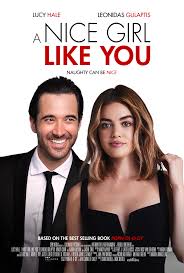Sometimes life pushes you out of your comfort zone in the most unexpected ways, and that’s exactly what happens in A Nice Girl Like You. Starring Lucy Hale in the lead role, this romantic comedy takes place in the present-day United States, primarily set in New York City. The movie, released in 2020, explores the struggles of self-discovery and the quirky journey of a woman breaking free from her tightly controlled and rule-bound life. Directed by Chris and Nick Riedell, it blends light-hearted humor with a touch of romance, making for an easy watch that falls firmly in the rom-com genre.
The film follows Lucy Hale’s character, Lucy Neal, a violinist who lives her life by the book—until her boyfriend accuses her of being sexually inhibited and ends their relationship. Devastated and confused, Lucy sets out on an unexpected journey of self-discovery by making a bold decision to complete an outrageous checklist of tasks designed to explore her sexuality and challenge her own inhibitions. As Lucy checks off daring tasks from the list, she finds herself in awkward and often hilarious situations, all while trying to understand who she really is and what she wants from life and relationships. Along the way, she meets Grant, played by Leonidas Gulaptis, and their budding romance adds a tender touch to the story.
One standout aspect of the film is Lucy Hale’s performance. Known for her role in Pretty Little Liars, Hale brings charm and likability to the character of Lucy Neal, making her journey of self-discovery both relatable and humorous. She captures the essence of a woman who is both confused and determined, juggling between embarrassment and newfound curiosity. Hale’s comedic timing, especially during scenes where she finds herself out of her element, keeps the film light and entertaining. Whether she’s fumbling through a sex shop or awkwardly engaging in risqué conversations, Hale’s natural charisma shines through, carrying the film even when the script falters. Leonidas Gulaptis, while playing a more subdued role, complements her well as Grant, offering a calm and supportive presence amidst Lucy’s chaotic self-exploration.
The direction by Chris and Nick Riedell maintains a steady, light-hearted tone throughout the film. The pacing is consistent, and despite the occasional cliché, the directors manage to keep the narrative engaging by relying on humor and the undeniable charm of the lead. The movie doesn’t aim for deep philosophical insights but rather focuses on delivering a fun and carefree story about stepping outside one’s comfort zone. The comedic elements are well-timed, and the film never takes itself too seriously, which works in its favor. The Riedell brothers ensure that the film is visually bright and breezy, with colorful New York City backdrops and vibrant interiors that reflect Lucy’s growing sense of freedom and adventure.
The cinematography by Bryan Koss supports this light atmosphere, with bright, warm lighting that enhances the playful and carefree nature of the film. New York’s eclectic spots, including quirky bookstores and chic city streets, serve as the perfect setting for Lucy’s transformation, and Koss captures the city’s charm effectively. While the film doesn’t require grand, sweeping visuals, the framing of Lucy’s journey in these spaces helps to highlight her growth from a tightly controlled woman to someone who is more willing to take risks and live freely.
In terms of music, the soundtrack, composed by Jay Lifton, is upbeat and blends seamlessly with the film’s fun, romantic tone. The music works well in moments of comedy, helping to amplify the lightheartedness of the situations Lucy finds herself in. The background score during the more tender moments between Lucy and Grant is understated but fitting, allowing the romance to develop naturally without feeling forced. Overall, while the music doesn’t stand out as a unique feature, it complements the movie’s overall vibe, providing the necessary emotional beats when needed.
The theme of the movie revolves around self-discovery and personal growth, specifically focusing on the taboos surrounding sexual expression. Lucy’s journey is one of confronting her own discomforts and societal pressures, which adds a layer of relatability for viewers, especially for those who have felt boxed in by societal expectations. The film doesn’t delve too deeply into these themes but rather keeps them at a surface level, presenting them in a humorous and non-threatening way. It makes Lucy’s journey feel less like a drastic transformation and more like a fun and necessary exploration of her own desires and boundaries.
One area where the film falters slightly is in its predictability. The rom-com formula is evident from the outset, and the film doesn’t offer any unexpected twists or deep emotional arcs. The supporting characters, while quirky, don’t have much depth, and some of the humor feels repetitive as Lucy embarks on her checklist adventure. The film also occasionally leans too heavily on stereotypes, particularly in the way it portrays certain aspects of sexuality and relationships. However, for viewers who enjoy a light and breezy rom-com, these elements won’t necessarily detract from the overall enjoyment of the movie.
In conclusion, A Nice Girl Like You is an enjoyable, albeit predictable, rom-com that offers laughs, charm, and an easy-to-watch storyline about breaking out of one’s shell. Lucy Hale’s charismatic performance keeps the film engaging, and the humor sprinkled throughout ensures that it remains a feel-good experience. The movie doesn’t aim to tackle heavy themes or offer profound insights but instead serves as a fun exploration of a woman finding herself in the most unexpected ways. If you’re in the mood for a lighthearted film with a playful twist on the rom-com genre, this one is a solid choice for a casual watch.







